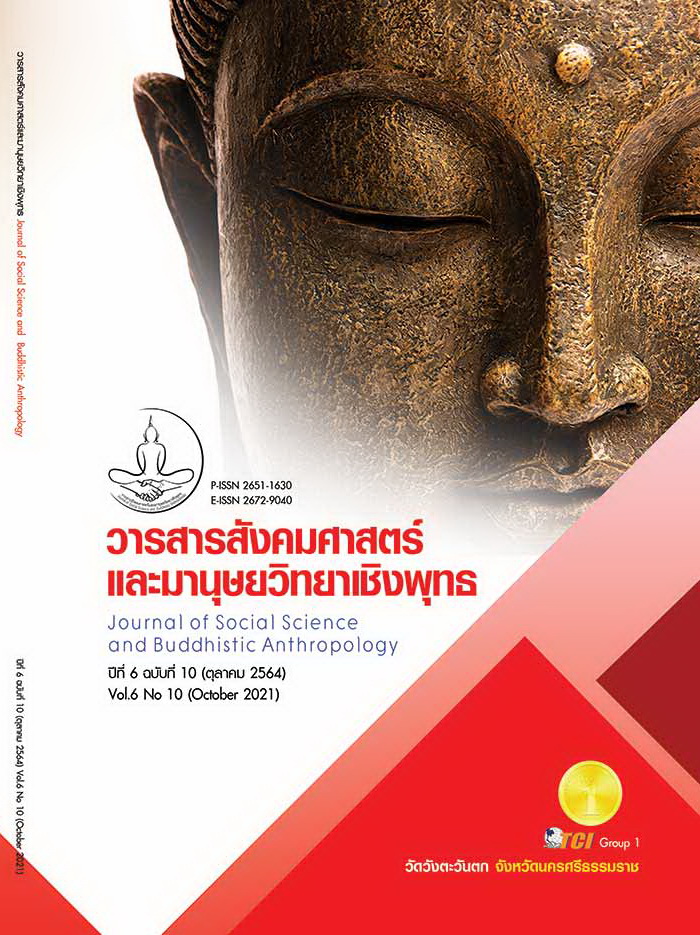A STUDY OF GUIDELINES FOR PROMOTING EXECUTIVE FUNCTIONS IN PRESCHOOLERS WITH ATTENTION DEFICIT/HYPERACTIVITY DISORDER
Keywords:
Executive Functions, Children with Attention Deficit Hyperactivity Disorder, Early ChildhoodAbstract
The objectives of this research article were 1) to study problems with promoting executive function in preschoolers with Attention-Deficit/Hyperactivity Disorder and 2) to study the best methods of promoting executive function in preschoolers with Attention-Deficit/Hyperactivity Disorder. There were two steps in this research. The first step was to synthesize studies of the methods and techniques to promote executive function. The target group studied consisted of eight studies related to the methods of promoting executive function. The research instrument was the research summary form. The second step was in-depth interviews with three experts in promoting executive function in the Thai context. The research tools here were in-depth interview guidelines. The data were analyzed by using descriptive statistics such as frequency, percent, and mean and using content analysis. The results of the research showed that (1) The major problem in promoting executive function in preschoolers with Attention-Deficit/Hyperactivity Disorder is that the adults dealing with the affected child (e.g., parents, teachers, and school administrators) typically lack knowledge about how to promote executive function. Also, the training period for using executive function is too short and the content is not uniform. (2) The guidelines for promoting a child’s executive function that should be emphasized to the adults are as follows: (a) enhancing an understanding of the executive function and how they are crucial to the child’s life, (b) providing the knowledge about how best to choose the appropriate activities, given the child’s age and interests, (c) encouraging activities that the girl or boy can do independently, (d) emphasizing that the training will be effective through consistent practice, and (e) using positive reinforcement to encourage and motivate the child’s practice. It’s essential to understand that parents or primary caregivers play the most important role in developing the child’s executive function.
References
กาญจนา บุหงอ และคณะ. (2563). ผลของการเสริมแรงด้วยเบี้ยอรรถกรที่มีต่อความมีวินัยในตนเองของเด็กปฐมวัยในโรงเรียนสังกัดสํานักงานเขตพื้นที่การศึกษาประถมศึกษาสุราษฎร์ธานี เขต 2. วารสารมหาจุฬานาครทรรศน์, 7(2), 15-30.
ชาญวิทย์ พรนภดล. (2559). จิตเวช ศิริราช DSM-5. กรุงเทพมหานคร: ประยูรสาส์นไทยการพิมพ์.
ฐาปนีย์ แสงสว่าง. (2559). ความสามารถคิดบริหารจัดการตน: แบบวัดและแนวทางการพัฒนาสำหรับนักเรียนชั้นประถมศึกษา. ใน ดุษดีนิพนธ์ปรัชญาดุษฎีบัณฑิต สาขาการวิจัยและพัฒนาศักยภาพมนุษย์. มหาวิทยาลัยศรีนครินทร์วิโรฒ.
ฑมลา บุญกาญจน์. (2560). การช่วยเหลือโดยใช้กิจวัตรประจำวันเป็นฐาน ในการให้บริการช่วยเหลือระยะแรกเริ่ม. วารสารวิจัยและพัฒนาการศึกษาพิเศษ, 6(1), 91-99.
นงลักษณ์ วิรัชชัย. (2552). รายงานการสังเคราะห์งานวิจัยเกี่ยวกับคุณภาพการศึกษาไทย:การวิเคราะห์อภิมาน (Meta-analysis). สำนักงานเลขาธิการสภาการศึกษา กระทรวงศึกษาธิการ, กรุงเทพมหานคร.
นวลจันทร์ จุฑาภัคดีกุล. (2558). Executive Functions กับความพร้อมทางการเรียนในเด็กปฐมวัย. กรุงเทพมหานคร: มหกรรมทางการศึกษาเพื่อพัฒนาวิชาชีพครู ครั้งที่ 8.
นวลจันทร์ จุฑาภัคดีกุล. (2560). Executive Functions (EF). กรุงเทพมหานคร: การประชุมวิชาการ เรื่อง ทักษะการคิดเพื่อชีวิตที่สำเร็จสำหรับเด็กในศตวรรษที่ 21.
นวลจันทร์ จุฑาภักดีกุล และคณะ. (2560). การพัฒนาและหาค่าเกณฑ์มาตรฐานเครื่องมือประเมินการคิดเชิงบริหารในเด็กปฐมวัย. เรียกใช้เมื่อ 23 สิงหาคม 2562 จาก http://kb.hsri.or.th/dspace/handle/11228/4650?locale-attribute=th
ภาณุศักร หงส์ทอง และคณะ. (2562). รูปแบบการบริหารงานวิชาการของสถานศึกษาในกรุงเทพมหานครเพื่อพัฒนาความสามารถในการบริหารจัดการตนเอง (Executive function: EF) ของเด็กปฐมวัย. วารสารมหาจุฬานาครทรรศน์, 6(6), 2765-2786.
ราณี อิ่มน้ำขาว และคณะ. (2564). บทบาทของพยาบาลในการเสริมสร้างทักษะ EF (การคิดเชิงบริหารและจัดการชีวิต) ในเด็กปฐมวัย. วารสารมหาจุฬานาครทรรศน์, 8(1), 239-244.
สุวรี ศิวะแพทย์ และคณะ. (2559). ผลของการเสริมแรงทางบวกต่อพฤติกรรมก่อกวนในชั้นเรียนของเด็กสมาธิสั้น. Journal of Education Khon Kaen University (Graduate Studies Research), 9(4), 212-219.
Barkley, R. (2017). 7 Executive Function Deficits Tied to ADHD. [Online]. Retrieved November 16, 2019, from https://www.additudemag.com/7-executive-function-deficits-linked-to-adhd/?fbclid=IwAR10kjknAXnZVtzfweIiIjDG-
Corcoran, R. P. & O'Flaherty, J. (2017). Executive Function during Teacher Preparation. Teaching and Teacher Education, 63(2017), 168-175.
Kofler, M. J. et al. (2018). Working Memory and Organizational Skills Problems in ADHD. Journal of Child Psychology and Psychiatry, and Allied Disciplines, 59(1), 57-67.
Kuhn, L. J. et al. (2017). Examining an Executive Function Battery for Use with Preschool Children with Disabilities. Journal of Autism and Developmental Disorders, 47(2017), 2587-2594.
Parong, J. et al. (2017). Learning Executive Function Skills by Playing Focused Video Games. Contemporary Educational Psychology, 51(2017), 141-151.
Pellicano, E. et al. (2017). Executive function predicts school readiness in autistic and typical preschool children. Cognitive Development, 43(2017), 1-13.
Rhoads, C. L. et al. (2018). Put Your Hands Up! Gesturing Improves Preschoolers’ Executive Function. Journal of Experimental Child Psychology, 173(2018), 41-58.
Shuai, L. et al. (2017). Executive Function Training for Children with Attention Deficit Hyperactivity Disorder. Chinese Medical Journal, 130(5), 549-558.
Vitiello, V. E. & Greenfield, D. B. (2017). Executive functions and approaches to learning in predicting school readiness. Journal of Applied Developmental Psychology, 53(2017), 1-9.









